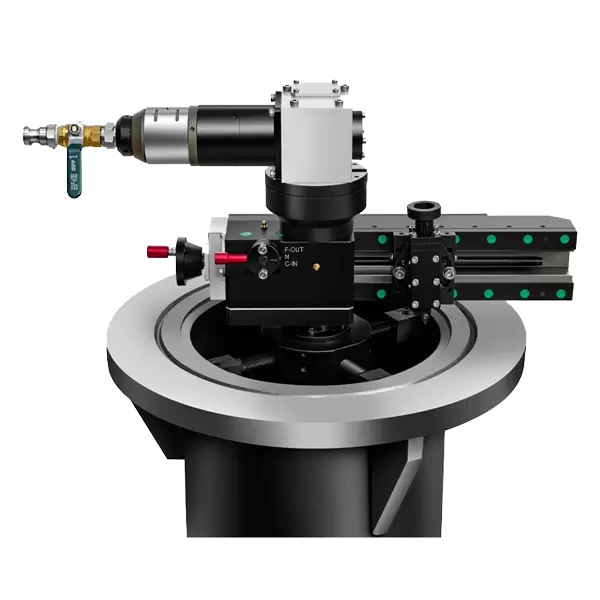The flange facing machine is a mechanical equipment specially used for processing and repairing flange end faces. It is widely used in petroleum, chemical, electric power, shipbuilding, pharmaceutical, food processing and other industries involving pipeline connection. As a key connecting component in the pipeline system, the end face quality of the flange directly affects the sealing, safety and service life of the pipeline. The emergence of the flange facing machine provides an efficient and accurate solution for the processing, repair and maintenance of flanges. This article will discuss in detail the main uses, applicable scenarios and application value of the flange facing machine in various industries.
During the manufacturing process, the end face of the flange needs to be precisely processed to ensure that its surface flatness, roughness and dimensional accuracy meet the design standards. The flange facing machine uses high-precision cutting tools to precisely process the flange end face to ensure its end face quality and meet the high sealing requirements of the industrial pipeline system.
During long-term use, the flange end face may be worn, scratched or deformed due to high temperature, high pressure, chemical corrosion or mechanical damage, affecting the sealing effect. The flange facing machine can re-cut and repair the damaged flange end face to restore it to the original standard size and surface quality, extend the service life of the equipment, and reduce replacement costs.
The pipeline systems in the petroleum, chemical, and electric power industries require regular maintenance, especially at the flange connection parts. Any deformation or corrosion of the end face may lead to leakage risks. The flange facing machine can repair the flange on site without disassembling the pipeline, greatly reducing downtime and improving maintenance efficiency.
Before pipeline installation and flange welding, the flange end face needs to be pre-treated to ensure welding quality. The flange facing machine can be used for groove processing before welding to ensure that the flange end face after welding is flat and smooth, and improve welding strength and sealing performance.
Some special pipeline systems require flange connections at specific angles to meet complex fluid transportation requirements. The flange facing machine can adjust the cutting angle according to actual needs to achieve the processing of non-standard flange end faces to meet the needs of special working conditions.

Oil and gas pipeline systems are usually in high temperature and high pressure environments, and the sealing of flange connection parts is crucial. flange facing machines can accurately repair damaged flange end faces, ensure the safety and stability of oil and gas transportation, and reduce economic losses and environmental pollution caused by leakage.
Pipeline transportation of chemical companies often involves corrosive media, such as acids, alkalis, solvents, etc., and flange end faces are susceptible to chemical corrosion and failure. flange facing machines can reprocess damaged flanges, restore their sealing performance, and reduce safety hazards caused by flange leakage.
In thermal power plants, nuclear power plants and other facilities, the pipeline system is subjected to high temperature and high pressure, and the quality of the flange end face directly affects the safety of the pipeline system. flange facing machines are widely used in the maintenance process of power plants, which can effectively repair worn or deformed flange end faces and improve the stable operation capacity of power station equipment.
The ship's piping system is widely distributed in multiple key links such as the power system, ballast system, and cooling system. The reliability of flange connections is directly related to the normal operation of the ship. During the shipbuilding and maintenance process, the flange facing machine can be used to process and repair various flanges to ensure the sealing and safety of the pipeline system.
The pharmaceutical and food processing industries have extremely high requirements for the hygiene of the pipeline system. The flange end faces must be smooth and pollution-free to ensure that the production environment meets industry standards. The flange facing machine can provide high-precision processing to ensure the smoothness and sealing of the flange end faces and prevent pollutants from entering the production system.
The flange facing machine adopts precision cutting technology to achieve micron-level processing accuracy, ensure the flatness and sealing of the flange end faces, and increase the service life of the flange.
The portable flange facing machine can be repaired at the pipeline operation site without disassembling the flange, greatly reducing downtime and improving production efficiency.
The flange facing machine can be applied to flanges of different sizes and materials, including carbon steel, stainless steel, alloy steel, etc., to meet the needs of different working conditions.
The modern flange facing machine adopts intelligent control and is easy to operate. Technical personnel can master the use method after a short training, which improves work efficiency.
Using the flange facing machine to repair the flange can effectively avoid leakage problems caused by damage to the flange end face, reduce the occurrence of safety accidents, and ensure the safety of the production environment.
The flange facing machine plays an indispensable role in industrial production, equipment maintenance and pipeline system maintenance. Its main uses include flange end face processing, repair, maintenance, welding pretreatment and angle adjustment, etc., and it is widely used in petroleum, chemical, electric power, shipbuilding, food, pharmaceutical and other industries. With the continuous advancement of technology, the flange facing machine will achieve greater breakthroughs in intelligence, portability, and multi-functionality, providing more efficient and accurate processing solutions for various industries.